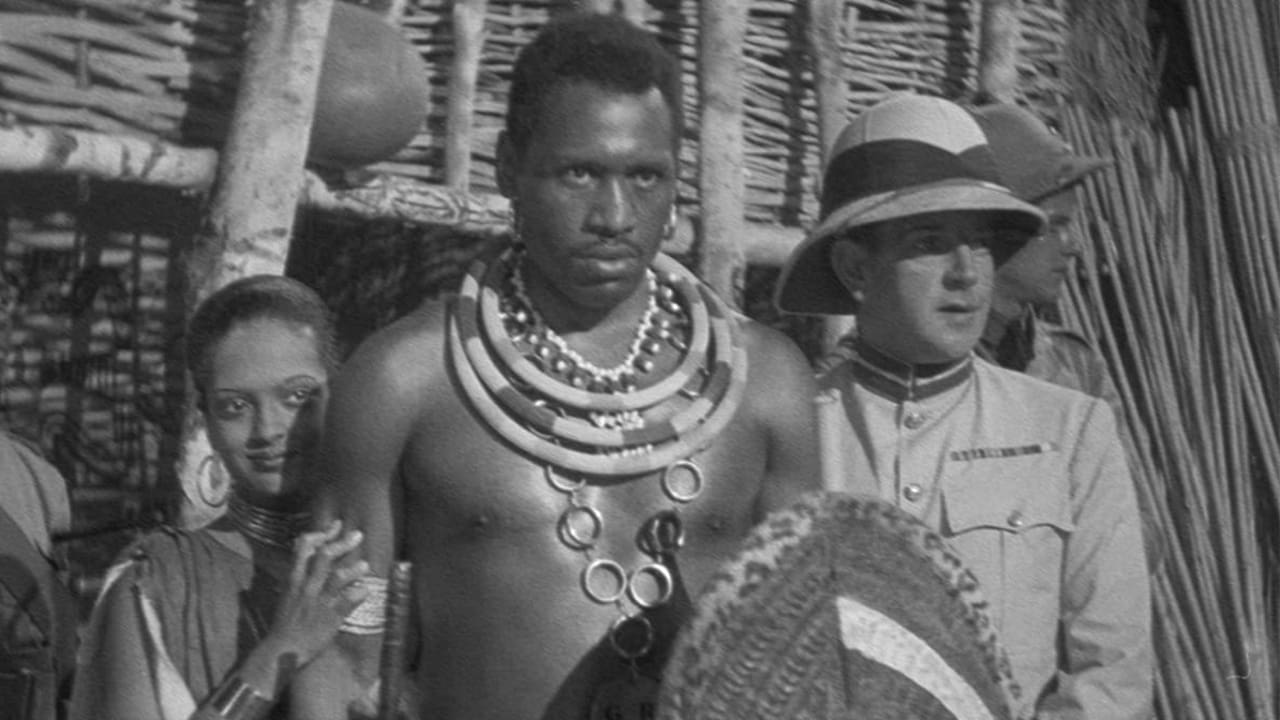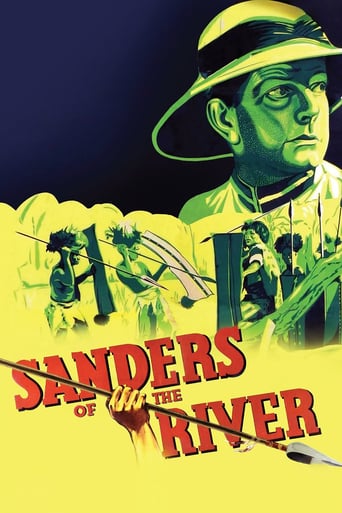



This Movie Can Only Be Described With One Word.
Gripping story with well-crafted characters
The film was still a fun one that will make you laugh and have you leaving the theater feeling like you just stole something valuable and got away with it.
View MoreA film of deceptively outspoken contemporary relevance, this is cinema at its most alert, alarming and alive.
View MoreTells the story of an outsider(Paul Robeson, as Bosambo) who migrated into central Nigeria(then part of British West Africa), along the Niger River, and soon became a chief of the Ochuri people(sounds very unlikely). He is tall and robust: a good warrior when he has to be, but prefers to promote peace among and between the various tribes of the region, against raids for slaves and wives. Hence, Bosambo has become a favorite of the district commissioner: Sanders. He hopes to make him chief of all the tribes along this stretch of the river, as a first step toward detribalization of the region.Opposing this plan is King Mofolaba, who wants to continue raids for slaves and more wives. He is especially angry at Bosambo for making him give up the people in his last raid. Among these people was Bosambo's future wife: Lilongo(Nina Mae McKinney). In the temporary absence of Sanders from the region, Mofolaba wants to capture and kill Bosambo, using his captured wife as bait. His wife is captured, and Bosambo decides to treck alone to Mofolaba's village to negotiate the release of his wife, a very dangerous move. He is also captured and tied to a stake, ready to be killed. But, Sanders has returned, and is commanding a gunboat, making the difficult journey up the rivet to Mofolaba's village. He arrives just in time to free Bosambo and his wife, spraying machine gun bullets toward the village(although,I didn't see any warriors fall, just runaway!). After Mofolaba is dispatched, at a gathering of all the chiefs in the region, Sanders asks them to accept Bosambo as their higher chief. I should mention that 2 white men were smuggling rifles and liquor to the natives. They spread the rumor that Sanders had died, thus inducing Mofolaba to resume his slave raiding. But, when he found out this wasn't true, Mofolaba had these 2 killed. It was interesting seeing the native people being themselves, including their ritual singing and dancing. Robeson sang several warrior songs: "The Song of the Spear", and "The Lion Song". Nina Mae McKinney sang the lullaby "My Little Black Dove" to her infant child. Paul Robeson was very appropriate to play Bosambo. He was born in America, but came to spend much time in Britain and Europe, away from the racial prejudice of America. He was a superb athlete, and genius: learning many languages and was valedictorian of his Rutgers class. He was an accomplished singer and actor, having sung "Ole Man River" in the 1936 film version of "Showboat". Later, he became involved in civil rights, and flirted with Communism. After finishing the present film, he was sorry he had participated in it, feeling that it rationalized colonialism more than bringing the native African to the attention of American audiences. Nina Mae McKinney, who played Bosambo's wife, was also born in the US and also spent much time in Europe, getting away from the prejudice in America, and especially Hollywood. She was regarded as quite beautiful, and talented in acting and singing. Her beauty was actually a handicap for Hollywood roles, at this time.
View MoreSanders is a British officer who has picked up the white man's burden and made Nigeria a better place for the Africans who populate it. We know they are happy, because they are always singing. The British do not sing, however, because running an empire is serious business. There seems to be a cult of personality, however, since the place falls apart as soon as Sanders goes on vacation. As word spreads that he is dead, we see animals running about, so apparently even they are upset. War breaks out, and Sanders has to return. While he was gone, a couple of smugglers had been selling gin and rifles to the natives, which is against the law. But the rifles don't seem to do the natives any good, because they continue to use spears. As the boat Sanders is on races to save Bosambo, a good African chieftain who loves being ruled by Sanders and the British Empire, an officer commands an African worker who is operating the boiler to put more wood on the fire for more speed. The African replies that the boiler will blow. But the stiff upper lip of the British officer is not cowed by mere physics, and he contemptuously dismisses the warning. The boiler backs down and humbly submits to British authority, just like everything else.
View More"Sanders of the River" is trapped in the time of its creation like an insect in amber, but it's worth seeing if only to understand the expectations of that time.The British characters are supposed to be the heroes of the tale, but they are wooden and unsympathetic, even interchangeable. It is impossible to care about them. They even chase animals from a plane Just For Fun.Africans are portrayed as simple minded, but they are also clearly loyal, brave, loving individuals with some (limited) depth to them, which is more than can be said of the cardboard cut-out white characters. In fact, the real rotters of the tale are trouble-making whites.
View MoreViewed today, 74 years after the film came out Sanders Of The River is a paradoxical film with the good and bad of British colonial attitudes of the 19th century. It's based on the first novel by Edgar Wallace, prolific British author who spent much time in Africa during the latter 19th and early 20th century.Sanders played by Leslie Banks is the local administrator of an area of what is now Nigeria and a man who is confidently shouldering the white man's burden as he saw it. Nevertheless he's probably the best representative of his type in the area, someone the British see as the best in themselves.He's taken the trouble to study the languages and cultures of the various tribes in his area and mixes in the local politics judiciously and fairly. When one of the tribal kings, Tony Wane, starts resorting to the slave trade which the British fought vigorously to suppress, Banks comes up with his own instrument of enforcement.His instrument is rival king, Paul Robeson of a different tribe and on that the plot of Sanders Of The River turns. Robeson was over in the United Kingdom at the time because he could not get the kind of film roles he wanted in the USA with America hung up on stereotypical blacks. Though the film is a salute to the judiciousness and fairness of British colonial role, Robeson took the part because I believe it gave him a chance to show the real Africa. There is no way America was ever going to make this kind of film. After MGM's near disaster with Trader Horn, American companies shied from location shooting until there until The African Queen and King Solomon's Mines.Though taking place in the Nigeria area, the film was shot on location in the Kenya colony and we learned that the first Kenyan president, Jomo Kenyatta actually was an extra in this film. Robeson gets a chance to sing a couple of songs written by Mischa Spoliansky and Arthur Winder, but are as good in the black idiom as Gershwin's Porgy and Bess. No way Paul Robeson would have sung them if they weren't.Robeson is joined in the vocal department by Nina Mae McKinney who scored big in King Vidor's Hallelujah, but was then unable to find decent roles for a beautiful black singer. That would wait until Lena Horne came on the scene and not altogether satisfactorily done there. She plays Robeson's wife and mother of his child and her capture by the rival king sets off a potentially nasty blood bath.Sanders Of The River though incredibly dated should be seen quite frankly because of that. Robeson's singing voice is at its best here and this is a picture of Africa you won't get in Tarzan films.
View More